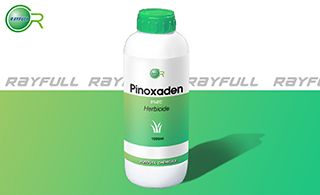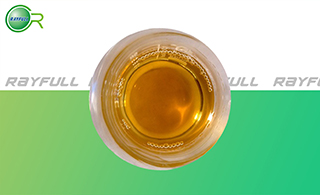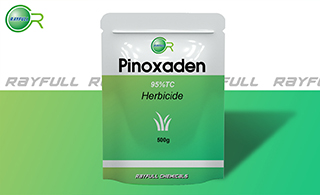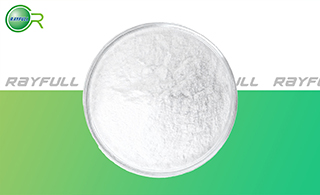PINOXADEN
    唑啉草酯 唑啉草酯
Introduction: A herbicide for post-emergence control of annual grass weeds including blackgrass, bluegrass, common windgrass, reed canary grass, foxtail, Avena spp. in cereals including winter & spring barley, winter wheat, durum wheat, rye, triticale.
Common name: Pinoxaden
Another name: UNII-U55GLF9LV9, U55GLF9LV9, BIP162, CHEBI:83524, Pinoxaden [ISO], etc.
Chemical name: 8-(2,6-diethyl-p-tolyl)-1,2,4,5-tetrahydro-7-oxo-7H-pyrazolo[1,2-d][1,4,5]oxadiazepin-9-yl 2,2-dimethylpropionate
Empirical formula: C23H32N2O4
Structural formula:

Mol. Weight: 400.51 g/mol
CAS No.: 243973-20-8
Specifications
Leading Pinoxaden supplier
Pinoxaden 50 g/L EC
Pinoxaden 95% TC
Packing:
BULK PACKING
Solid: 25kg/Bag, 25kg/Drum, 50kg/Drum etc.
Liquid: 200L/Drum, 20L/Drum, 10L/Drum ect.
SMALL PACKING
Solid: 1kg/Alu bag, 500g/Alu bag, 200g/Alu bag, 100g/Alu bag, 50g/Alu bag, 15g/Alu bag etc.
Liquid: 5L/Drum, 1L/Bottle, 500ml/Bottle, 250ml/Bottle, 100ml/Bottle, 50ml/Bottle etc.
Customerized packing label
Pinoxaden FAO standard
Professional registration
HAZARDS IDENTIFICATION
Hazard statement(s)
H315 (67.14%): Causes skin irritation.
H317 (67.14%): May cause an allergic skin reaction.
H319 (100%): Causes serious eye irritation.
H332 (100%): Harmful if inhaled.
H335 (100%): May cause respiratory irritation.
H412 (67.14%): Harmful to aquatic life with long lasting effects.
Precautionary statement(s)
P261: Avoid breathing dust/fume/gas/mist/vapors/spray.
P264: Wash ... thoroughly after handling.
P271: Use only outdoors or in a well-ventilated area.
P272: Contaminated work clothing should not be allowed out of the workplace.
P273: Avoid release to the environment.
P280: Wear protective gloves/protective clothing/eye protection/face protection.
P302+P352: IF ON SKIN: wash with plenty of water.
P304+P312: IF INHALED: Call a POISON CENTER/doctor/... if you feel unwell.
P304+P340: IF INHALED: Remove person to fresh air and keep comfortable for breathing.
P305+P351+P338: IF IN EYES: Rinse cautiously with water for several minutes. Remove contact lenses if present and easy to do - continue rinsing.
P312: Call a POISON CENTER or doctor/... if you feel unwell.
P321: Specific treatment (see ... on this label).
P332+P313: IF SKIN irritation occurs: Get medical advice/attention.
P333+P313: IF SKIN irritation or rash occurs: Get medical advice/attention.
P337+P313: IF eye irritation persists: Get medical advice/attention.
P362: Take off contaminated clothing.
P363: Wash contaminated clothing before reuse.
P403+P233: Store in a well-ventilated place. Keep container tightly closed.
P405: Store locked up.
P501: Dispose of contents/container to ...
Supplemental Hazard Statements: none
MAMMALIAN TOXICOLOGY
Acute toxicity: 1) Acute oral LD50 for rat: >5000 a.i.mg/kg. 2) Acute dermal LD50 for rat: >2000 a.i.mg/kg. 3) Inhalation LC50 (4 h) for rat: >4.63 a.i.mg/L. 4) Non irritating to the skin. (rabbits). 5) Formulation is irritating to the eye (rabbits). 6) Not a skin sensitiser (guinea pigs).
Did not show carcinogenic, teratogenic or mutagenic effects in animal experiments.
ADI(JMPR): 0.1 mg/kg b.w. [2016]
Classification:
EC Risk Classification: Xi - Irritant: R36, R38; N - Dangerous for the environment: R51, R53
ECOTOXICOLOGY
Effect on birds: low toxicity to birds, acute oral LD50 for Mallard ducks is >2250 a.i.mg/kg. Effect on fish: moderate toxicity to fish, acute 96 hour LC50 for Rainbow trout is 10.3 a.i.mg/L. Effect on algae: moderate toxicity to algae, acute 72 hour EC50 for Skeletonema costatum is 0.91 a.i.mg/L. Effect on honeybees: low toxicity to honeybees, contact acute 48 hour LD50 is >100 a.i.μg/bee, oral acute 48 hour LD50 is >200 a.i.μg/bee. Effect on earthworms: low toxicity to earthworms, acute 14 day LC50 for Eisenia foetida is >1000 a.i.mg/kg.
ENVIRONMENTAL FATE
Pinoxaden's production may result in its release to the environment through various waste streams; its use as a herbicide will result in its direct release to the environment. If released to air, a vapor pressure of 3.5×10-9 mm Hg at 25 deg C indicates pinoxaden will exist solely in the particulate phase in the atmosphere. Particulate-phase pinoxaden will be removed from the atmosphere by wet or dry deposition. If released to soil, pinoxaden is expected to have moderate to high mobility based upon a Koc range of 852 to 121. Volatilization from moist soil surfaces is not expected to be an important fate process based upon an estimated Henry's Law constant of 9.1×10-12 atm-cu m/mole. Pinoxaden biodegrades rapidly with an aerobic half-life of 2 to 3 days in soil and an aerobic half-life of <1 day in water. If released into water, pinoxaden is expected to adsorb to suspended solids and sediment based upon the Koc. Volatilization from water surfaces is not expected to be an important fate process based upon this compound's estimated Henry's Law constant. An estimated BCF of 60 suggests the potential for bioconcentration in aquatic organisms is moderate. Pinoxaden hydrolysis half-lives are reported as 24.1, 25.3, 14.9 and 0.3 days at pH 4, 5, 7 and 9, respectively. Occupational exposure to pinoxaden may occur through inhalation and dermal contact with this compound at workplaces where pinoxaden is produced or used. (SRC)
Usage: Manufacturers: Syngenta. Pinoxaden is a selective post-emergence herbicide for the control of annual grass weeds in cereal crops. Pinoxaden belongs to the phenylpyrazole class of herbicides which acts by inhibiting the enzyme acetyl-CoA carboxylase (ACCase).
Application: For post emergence control of grass weeds in wheat (including durum) and barley. One application per crop season by agricultural workers using either open-cab ground boom equipment or via aerial application. Application rates of 0.036-0.062 lb active ingredient per acre.
| 






